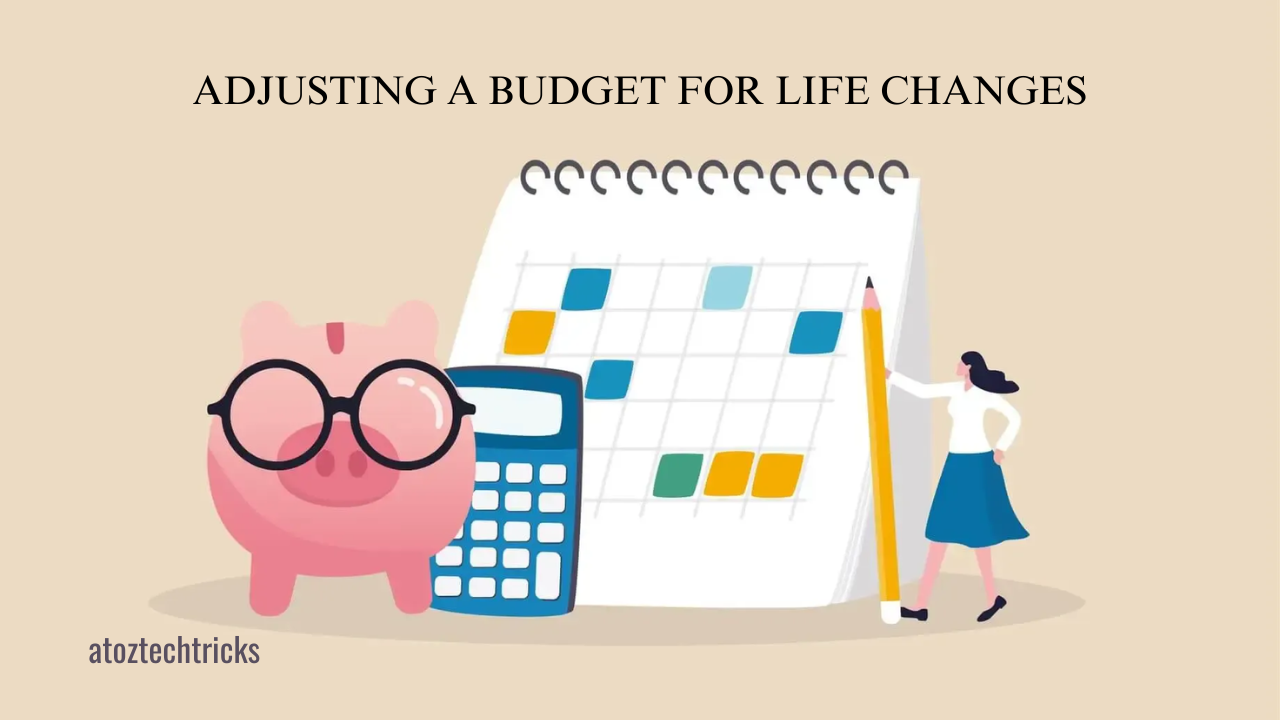How to Adjust Your Budget for Life Changes: A Comprehensive Guide
Life is full of changes, and each transition can have a significant impact on your financial situation. Whether you’re starting a new job, moving to a new city, getting married, having a baby, or facing a significant life event, adjusting your budget is crucial to maintaining financial stability and achieving your financial goals. This guide provides a step-by-step approach to adjusting your budget for various life changes, ensuring you stay on track regardless of the circumstances.
Understanding the Importance of Budget Adjustments
A budget is not a static tool; it’s a dynamic plan that should evolve with your changing circumstances. When life changes occur, your income, expenses, and financial priorities may shift. Adjusting your budget helps you manage these changes effectively, avoid unnecessary debt, and continue working towards your financial goals. Here’s why it’s essential:
- Maintain Financial Stability: By adjusting your budget, you can better manage your expenses and ensure you have enough funds to cover your needs.
- Prevent Overspending: Life changes can lead to new expenses or changes in income. A revised budget helps prevent overspending and ensures you live within your means.
- Achieve Financial Goals: Regular budget adjustments keep you on track to meet your short-term and long-term financial goals, such as saving for a house, retirement, or an emergency fund.
How to Effectively Budget for Unexpected Expenses – Tips and Strategies
Common Life Changes and How They Impact Your Budget
1. Starting a New Job
Starting a new job often comes with changes in salary, benefits, and work-related expenses. Here’s how to adjust your budget:
- Review Your Income: Compare your new salary to your previous one. Adjust your budget to reflect the increase or decrease in income.
- Update Tax Withholdings: Ensure that your tax withholdings are accurate based on your new salary. Consider adjusting your W-4 form if necessary.
- Adjust Benefits Contributions: Update your budget to account for changes in health insurance premiums, retirement contributions, and other benefits offered by your new employer.
- Account for Commute and Work Expenses: Include any additional expenses related to commuting or new work-related costs in your budget.
2. Moving to a New City
A move can impact your budget in various ways, from changes in housing costs to adjustments in your cost of living.
- Update Housing Costs: Factor in the cost of your new rent or mortgage, including utilities and other related expenses.
- Revise Transportation Costs: Adjust your budget for new transportation expenses, such as public transit or vehicle maintenance.
- Consider Cost of Living Adjustments: Research the cost of living in your new city and adjust your budget for groceries, dining out, and other daily expenses.
- Account for Moving Costs: Don’t forget to include one-time moving expenses, such as hiring movers or purchasing moving supplies.
3. Getting Married
Marriage often involves combining finances and adjusting your budget to reflect shared expenses and financial goals.
- Combine and Review Accounts: Evaluate and merge bank accounts, credit cards, and other financial accounts as needed. Update your budget to reflect joint expenses.
- Update Insurance and Benefits: Review and update your health insurance, life insurance, and other benefits to include your spouse.
- Set Shared Financial Goals: Discuss and set financial goals with your spouse, such as saving for a house or planning for vacations. Adjust your budget to align with these goals.
- Account for New Expenses: Include any new expenses, such as joint bills or shared subscriptions, in your budget.
Money-Saving Tips for Different Income Levels | Find the Best Strategies for Your Budget
4. Having a Baby
A new addition to your family comes with various financial implications that require careful budget adjustments.
- Estimate Child-Related Expenses: Calculate the costs of baby essentials, such as diapers, clothing, and healthcare. Include these in your budget.
- Plan for Increased Healthcare Costs: Factor in additional healthcare expenses, including prenatal care, delivery, and pediatric visits.
- Adjust for Parental Leave: If you’re taking parental leave, adjust your budget to account for any reduction in income during this period.
- Review Childcare Options: If you plan to use childcare services, include these costs in your budget.
5. Facing a Significant Life Event (e.g., Divorce, Illness)
Significant life events can dramatically impact your finances, requiring a thorough budget review and adjustment.
- Assess Changes in Income and Expenses: Evaluate how the event affects your income and expenses. Adjust your budget to reflect any reductions or increases.
- Reevaluate Financial Goals: Revisit your financial goals and priorities in light of the new circumstances. Adjust your budget to align with these revised goals.
- Seek Professional Advice: For complex financial situations, such as divorce or serious illness, consider consulting with a financial advisor or counsellor to navigate the changes effectively.
Steps to Adjust Your Budget for Life Changes
1. Evaluate Your Current Budget
Before making any adjustments, review your current budget to understand your existing income, expenses, and savings. Identify areas where changes are needed based on your life transition.
2. Calculate the Impact of the Life Change
Quantify how the life change affects your finances. This includes calculating any changes in income, expenses, and savings. Create a detailed list of all the new or modified financial factors.
3. Revise Income and Expense Categories
Update your budget categories to reflect the changes. This may involve creating new categories for specific expenses or adjusting existing ones. Ensure that all changes are accurately reflected in your budget.
4. Adjust Savings and Debt Repayment Plans
Reevaluate your savings goals and debt repayment plans based on your new financial situation. Adjust your contributions to savings accounts, retirement funds, and debt payments as needed.
5. Monitor and Track Your Adjustments
Once you’ve adjusted your budget, monitor your spending and track your progress. Regularly review your budget to ensure it remains aligned with your financial goals and circumstances.
6. Seek Professional Advice if Needed
For complex financial situations or significant life changes, consider seeking advice from a financial advisor or counsellor. They can provide personalized guidance and help you navigate the adjustments effectively.
8 Tips for Successfully Sticking to a Budget and Saving Money
Tips for Successful Budget Adjustments
- Be Realistic: Set realistic expectations for your budget adjustments. Understand that some life changes may require a period of financial adjustment.
- Communicate: If you’re adjusting your budget due to changes involving a partner or family, communicate openly about financial expectations and responsibilities.
- Stay Flexible: Be prepared to make further adjustments as needed. Life changes can be unpredictable, and your budget may need to evolve accordingly.
- Utilize Budgeting Tools: Consider using budgeting apps or tools to help track your expenses and manage your budget more effectively.
- Prioritize Savings: Ensure that your budget includes a focus on savings, even when making adjustments for new expenses. This helps maintain financial stability and achieve long-term goals.

Adjusting your budget for life changes is essential for maintaining financial stability and achieving your financial goals. Whether you’re starting a new job, moving to a new city, getting married, having a baby, or facing a significant life event, taking the time to review and revise your budget ensures you stay on track. By following the steps outlined in this guide and staying flexible, you can effectively manage your finances and navigate life’s transitions with confidence.





Post Comment